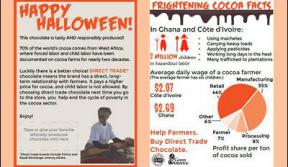Major US chocolate makers, including M&M/Mars, Hershey's and others, have asked to join the US Customs Service as defendants in a human rights suit that demands the US government enforce its own trade laws prohiting the importation of goods made with child/slave labor.
The International Labor Rights Fund (ILRF) filed suit against the US Customs Service for failure to enforce its own laws protecting US consumers from goods made by forced child labor in October 2004. Last week, the Chocolate Manufacturers' Association (CMA), the industry group representing importers, exporters and retailers of chocolate products in the US, took the highly unusual step of requesting to join the suit as a defendant. The court has granted the request. ILRF will be filing a response to the Customs Service's motion to dismiss in the the Court of International Trade (CIT) on February 22, 2005.
By intervening in the suit, the chocolate industry is siding with the Bush Administration in arguing that a US law intended to protect consumers from goods made by slave labor or forced child labor should not be enforced. In 2001, media reports exposed the use of slave child labor in cocoa production in West Africa, the world's largest source of cocoa beans. In response to the public outcry, the chocolate industry promised to voluntarily engage in self-monitoring, to be implemented on a worldwide basis by July 2005. Despite this promise, the CMA is now arguing in its brief to the court that the law prohibiting importation of slave child labor made goods should not be enforced. In its brief submitted to the CIT on January 28, 2005, the CMA states that it cannot possibly fulfil the promises made in 2001, and blames political uncertainty in West Africa for its own failures to implement a credible monitoring program.
The ILRF filed a petition with the U.S. Customs Service on May 30, 2002, to initiate an investigation and enforcement action under section 307 of the Trade Act of 1930, 19 U.S.C.§ 1307 (1997). The law prohibits the importation of goods made by forced labor or child slavery. To date, the Bush Administration has not intervened nor attempted to enforce the law, despite the fact that the ILRF's independent investigations in Cote d'Ivoire proved child slavery continues to exist on cocoa farms producing for exports to the US. The ILRF initiated the suit against the US Customs Service in October 2004 to compel the Bush Administration to undertake an investigation and enforce the law.
"The chocolate industry clearly believes that enslaving children is an acceptable cost of business in order to continue to reap enormous profits," said Bama Athreya of the ILRF. "If companies were serious about eliminating child labor from their supply chain, they would not be going to this unusual length to ensure non-enforcement of the law."
Plaintiffs in the case include Global Exchange and the Fair Trade Federation; both the organizations and their members have a strong interest in ending child slavery in cocoa production.
Despite the country's political instability, Cote D'Ivoire remains the largest cocoa exporter producing over 40% of the world's cocoa. Ten multinational corporations, including Nestle, Archer Daniels Midland and Cargill, control virtually all of the cocoa exported from Ivory Coast. Nestle, ADM and Cargill have administrative offices, distribution centers, storage facilities, and cocoa bean processing facilities in Ivory Coast. Once imported into the US, major chocolate retailers such as Hershey's and M&M/Mars process the cocoa into candy and chocolate items.

